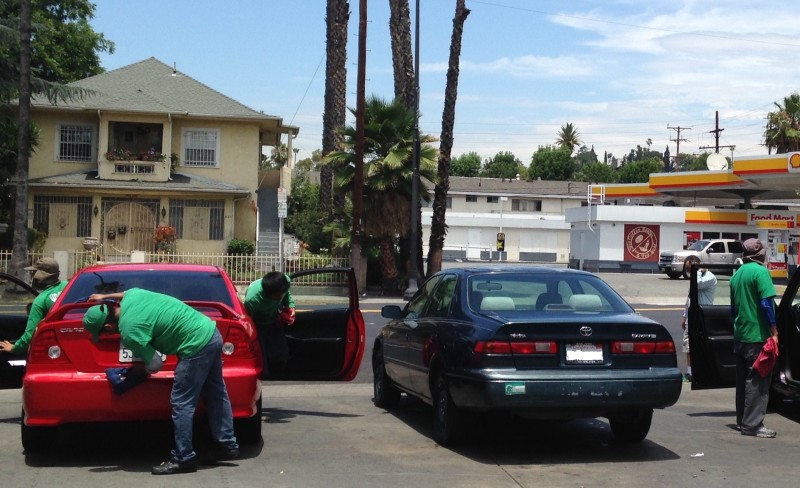“Right now my grandkids always say when I come home, 'Hey grandpa, what did you bring us?' Now I’m happy to say I can bring them something because of this increase in the minimum wage,” says Garcia, who shares a home with his adult son and daughter-in-law. “Now, thank God, I can do more for my family here and in Mexico.”
L.A.’s wage hike will rise in stages, topping out at $15 an hour in the year 2020.
It will bump up the pay of an estimated 800,000 low-wage workers.
And of those people, it’s the undocumented who tend to earn the least, says Tia Koonse of the UCLA Labor Center.
“Right now undocumented immigrants are making some of the lowest wages in the city,” says Koonse. “And if the minimum wage is enforced, then they will benefit tremendously.”
But critics say the pay hike is too much, too soon.
Ruben Gonzalez, of the Los Angeles Area Chamber of Commerce, says it will force some businesses to lay off workers and others to be extra picky.
“So what you’re going to do is pick the employee that has the most experience and the least amount of risk,” says Gonzalez.
He predicts that people on the lowest rungs of the workforce, like the undocumented, will get squeezed the hardest.
“You’re not going to give a chance to an immigrant worker who needs to be trained or may have difficulties with their status,” says Gonzalez.
He says businesses that would usually fill an open spot with a minimum wage worker might instead hire an undocumented person, pay them less and keep it off the books.
But that kind of thing is already happening.
“They don’t pay me for food or rest breaks or for all of my overtime hours,” says a garment worker named Pablo. He asked that we use just his first name because he’s undocumented.
Pablo stitches together women’s clothing in one of downtown L.A.’s many garment factories. He worries that bosses like the one he works for will shut down or move if forced to pay workers more.
Pablo earns a little over the $7.25 hourly federal minimum wage, which means his boss is already breaking the law. Employers in California must pay the higher state minimum of $9 an hour.
“Well, the truth is, there’s no hope for us. It wouldn't help if they were to raise the minimum wage to $20 an hour,” says Pablo. “We’re not guaranteed anything. I think that all the factory owners, they’re in union. And there’s no unity among us (workers).”
That’s why tougher wage and workplace enforcement is key, says Flor Rodriguez, an organizer at the Clean Carwash Campaign. It’s among a host of nonprofit watchdog groups that’s helping L.A.’s newly created Office of Labor Enforcement reach out to low-wage workers.
“And once that happens, I’m confident that workers can then speak up for themselves and be able to do something to make sure the employer complies,” says Rodriguez.
Many workers are already speaking up.
A few years ago, carwash worker Fausto Garcia filed a wage theft claim against one of his former employers with the California Division of Labor Standards Enforcement.
“It was a group of us. We built a case with the labor commissioner’s office. And the worker who spoke up the most, the owner told him: 'Get out or I’ll call immigration on you.' ”
The carwash was ordered to pay some $50,000 in back wages to a group of workers. But it shut down before paying up.
Garcia hopes to collect at least some of that money from a state restitution fund.
Workers like him could also get more help when L.A.’s own labor enforcement office opens next year, around the same time the city’s new minimum wage law kicks into gear.
